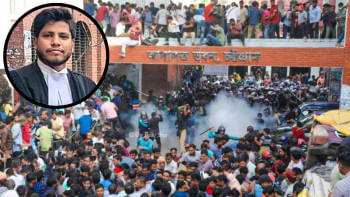Apon Bazaar Serving needs of industrial workers

While there are countless super shops in the city, none address the need of the urban poor. Most industrial workers too have always been set aside from mainstream market services. This is where Apon Bazaar comes into the picture. It is an impact business or a social enterprise dedicated to improving the lives of industrial workers, especially in the RMG sector, and their families.
Apon is a gateway for accessing a range of different well-being products and services through an inclusive business model that ensures financial inclusion, economic well-being, and better health. As a retail business with specific focus on blue collar workers, Apon Bazaar is having a direct impact on their finance, health, and grocery service sectors.
Saif Rashid, founder and MD of Apon Bazaar, explains their business strategy.
"We are an omni-channel marketplace of affordable products and services for industrial workers. Apon operates shops inside factories, selling food and other disposables to workers at slightly discounted prices. In partnership with consumer goods manufacturing companies, the grocery and household wares cost the workers up to 10 percent less than at retail outside the factory. Workers also can buy their grocery at credit which is adjusted with their salary next month. Both physical store and Apon app gives a seamless, convenient and modern shopping experience to the workers.
"For each purchase from the shop, a worker earns reward points that accumulate in their Apon account. For every 100 Bangladeshi takas spent, the worker earns 1 Apon point. With 200 points, the worker gains access to zero-cash health coverage and insurance from Green Delta Insurance Company for up to Tk 30,000 allowing them to get free medical diagnoses, prescriptions from a doctor, hospitalization, and life insurance coverage."

Apon is operating for four years and till date it has served 1 lakh RMG workers at 27 factories in Dhaka. They are retailers but unlike other retail stores, they do not have to pay rental or utility bills for the space. It is given by the garment factory. This helps Apon reduce its operating cost and thus the price of products in these stores is less than the usual maximum retail price (MRP) at regular stores.
"We are not an NGO. We do impactful business with commercial viability with the support of impact investors. There is a distinct difference between businesses that do business 'for impact' and 'with impact'.
"Business 'with impact' is a business whose main focus is of profit and impact will happen as a by-product, while businesses 'for impact' are solely done with the purpose of solving certain problem and profit comes as its by-product," says Rashid.
Impact focus business is also profitable with substantial social impact. Their main focus is not profit-making. The profit comes naturally to such business, defining a clear mindset of doing impact business.

"We sell at lower prices but our volume of sales is bigger allowing us to make a profit. Our impact is on their socio-economic well-being. They avail credit with no interest through buying groceries in credit and saving the difference between MRP and us, so far, we have provided more than USD 15 million worth of credit to the workers and they generated more than USD 600K savings," Rashid adds.
A person who is working a full-time job and for more than an eight-hour shift, should not stay below the poverty level, but these urban poor, who are mostly industrial workers in Dhaka, have always been set aside from mainstream market service. Apon is here to make a difference, and they have done just that!


 For all latest news, follow The Daily Star's Google News channel.
For all latest news, follow The Daily Star's Google News channel. 



Comments